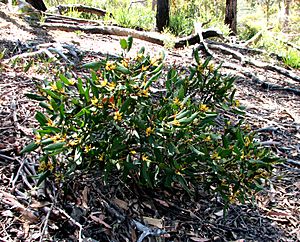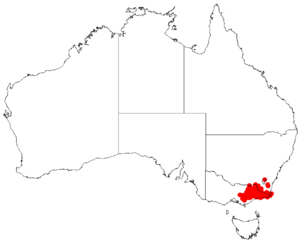Cluster-flower geebung facts for kids
Quick facts for kids Cluster-flower geebung |
|
|---|---|
 |
|
| Scientific classification |
|
| Kingdom: | Plantae |
| Clade: | Tracheophytes |
| Clade: | Angiosperms |
| Clade: | Eudicots |
| Order: | Proteales |
| Family: | Proteaceae |
| Genus: | Persoonia |
| Species: |
P. confertiflora
|
| Binomial name | |
| Persoonia confertiflora |
|
 |
|
| Occurrence data downloaded from AVH | |
| Script error: The function "autoWithCaption" does not exist. | |
| Synonyms | |
|
Linkia confertiflora (Benth.) Kuntze |
|
Script error: No such module "Check for conflicting parameters".
The Cluster-flower Geebung (scientific name: Persoonia confertiflora) is a cool flowering plant that belongs to the Proteaceae family. It's special because it's endemic to south-eastern Australia, meaning it only grows naturally in that area. This plant is usually a shrub that can stand tall or spread out low to the ground. It has fuzzy young branches, leaves shaped like eggs or narrow ovals, and yellow flowers that also have a bit of fuzz. These flowers grow in clusters from where the leaves meet the stem or at the ends of short branches.
What Does the Cluster-flower Geebung Look Like?
The Cluster-flower Geebung is a shrub that can grow from about half a meter to two meters (about 1.5 to 6.5 feet) tall. Its branches and young leaves are covered with light brown or rusty-colored hairs.
The leaves are usually found in pairs opposite each other on the stem. They can be egg-shaped, narrow oval, or even lance-shaped (like a spearhead). They are typically 3–90 mm (0.12–3.54 in) long and 13–30 mm (0.51–1.18 in) wide.
The flowers grow in clusters. You'll find them where the leaves join the stem, or at the very ends of short branches. Each flower sits on a straight, hairy stalk called a pedicel, which is about 1–2 mm (0.039–0.079 in) long. The flower parts, called tepals, are 12–14 mm (0.47–0.55 in) long and fuzzy on the outside. Each tepal has a small spine at its tip. Inside, the anthers (which hold pollen) are white.
This plant usually flowers from November to February. After flowering, it produces a fruit called a drupe. This fruit is oval-shaped, about 18 mm (0.71 in) long and 14 mm (0.55 in) wide. It starts out green and later turns purplish.
How Was This Plant Named?
The Cluster-flower Geebung was first officially described in 1870. A botanist named George Bentham gave it its formal scientific name, Persoonia confertiflora. He wrote about it in the fifth volume of his big book, Flora Australiensis.
Where Does the Cluster-flower Geebung Grow?
You can find the Cluster-flower Geebung growing in woodlands and forests. Its natural home stretches from near Mount Kosciuszko in New South Wales all the way down to eastern Victoria in Australia.
 | Janet Taylor Pickett |
 | Synthia Saint James |
 | Howardena Pindell |
 | Faith Ringgold |

